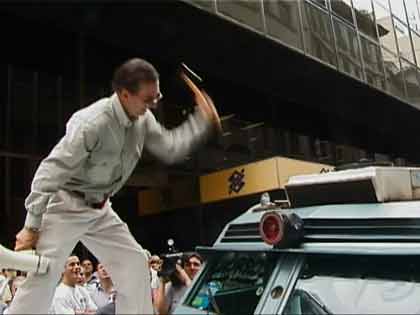

|
Home | SchNEWS OF THE WORLD Argentina SpecialCorralitoMoney For SaleThe banking restrictions, known as the corralito (meaning the corralling or ring-fencing of bank deposits), was imposed at the beginning of December, when nervous savers, feeling disaster approach, started to withdraw their money from the banks. Since then, its rules have changed almost daily, allowing a certain amount to be withdrawn each month, but also forcibly converting most savings, 80% of which had been deposited in dollars for security (!) into pesos at extremely unfavourable rates. Those who insisted on keeping their deposits - which exist on paper only now as the money is no longer in the country - in dollars, have been forced to accept bonds which may or may not be repaid in the next year or so, and almost certainly not in dollars. And those with pesos can only watch as the peso falls from one-to-one with the dollar, where it had been artificially pegged for eleven years, to a low of 4 a few weeks ago. The hated Supreme Court, in a manoeuvre calculated to save its own skin from moves in Congress to impeach them and from the angry threats of the people to go in and kick them out, decreed the corralito unconstitutional on the 1st of February. Some savers laid down their pots and pans to queue at the court for individual court orders to their banks to return their deposits, but banks have generally ignored these. Those with a lot of money or influence routinely skip out of the corralito with their money, either on the nod from their banks or through clever dealings with shares in Argentinean companies on the New York stock exchange. It’s a different story for businesses, which have been generously compensated by the (bankrupt) state for the peso-fication of their debts in dollars. Plans for the peso-fication, at one-to-one despite the plummeting peso, of debts contracted in dollars was intended to help individuals with debts like mortgages, who could never dream of repaying them in the devalued peso, and was going to apply only to debts of less than $100,000. But an investigation by reporters on the TV news show ‘Telenoche Investiga’, who were all sacked and their programme never broadcast, uncovered the truth about how the debts of big business came to be included in the rescue plan. On the 12th January, heads of large Argentinean corporations held a secret meeting with President Duhalde and three other members of the cabinet. They were told by the president that it might be possible for their massive debts to also benefit from conversion at one to one, if they were willing to make a ‘contribution’. Even the millionaire CEOs were taken aback at the size of the bribe he was soliciting – it was to be $500 million dollars, in dollars and in cash. The reporter was told that the money was to be divided between members of Congress and the Senate ($200 million) who would have to approve it, $175 million for Mendiguren, Lenicov and Capitanich, the cabinet members present that day, and a tidy $125 million for Duhalde. One empresario refused and is now under investigation by the DGI (General Tax Direcorate). The overall saving to businesses is estimated to be in the region of $20-30 billion dollars (YPF-Repsol oil, for example, has been able to halve its $310 million debt); the money will have to come from more cuts in public spending. Bourgeois BlockAn email to Schnews describes bizarre scenes as the ‘bourgeois block’, gangs of enraged savers denied access to their money, strikes again: “Tearing off the metal cladding, they invaded the bank lobbies and in full sight of the police, without a mask or black hoody to be seen, proceeded to destroy the cash machines. Women with perms, golden bracelets and high heels kicked at the windows, lipstick grins spreading as they watched the glass shatter. Every armoured security van the mob of 300 people came across was surrounded. Men in business suits proceeded to unscrew the wheel-nuts, while others prised open the bonnets, tearing out wires from the engines. Soccer mums jumped up and down on top of vans, smashing anything that could be broken, wing-mirrors, lights, number plates...”
|
 The
former middle class are 'avin' it on the street - pissed off with
the banks cos the banks won't give them their savings.
The
former middle class are 'avin' it on the street - pissed off with
the banks cos the banks won't give them their savings.